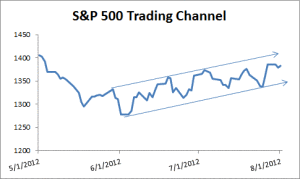This week, I am writing from Maine, so the posts will probably be somewhat shorter than normal and the timing may be erratic. I am taking the chance to research lobster rolls up here—for your benefit, of course. After reading a Wall Street Journal (WSJ) story on the best lobster rolls in Maine, I feel obligated to do my own research. Further reports as the story develops.
A quiet weekend, with the only meta-story being the Friday rally, variously attributed to a Spanish bailout hint in the Financial Times (FT) and to job gains in the WSJ. Monday really had no meta-stories, but the papers displayed interesting differences in focus.





